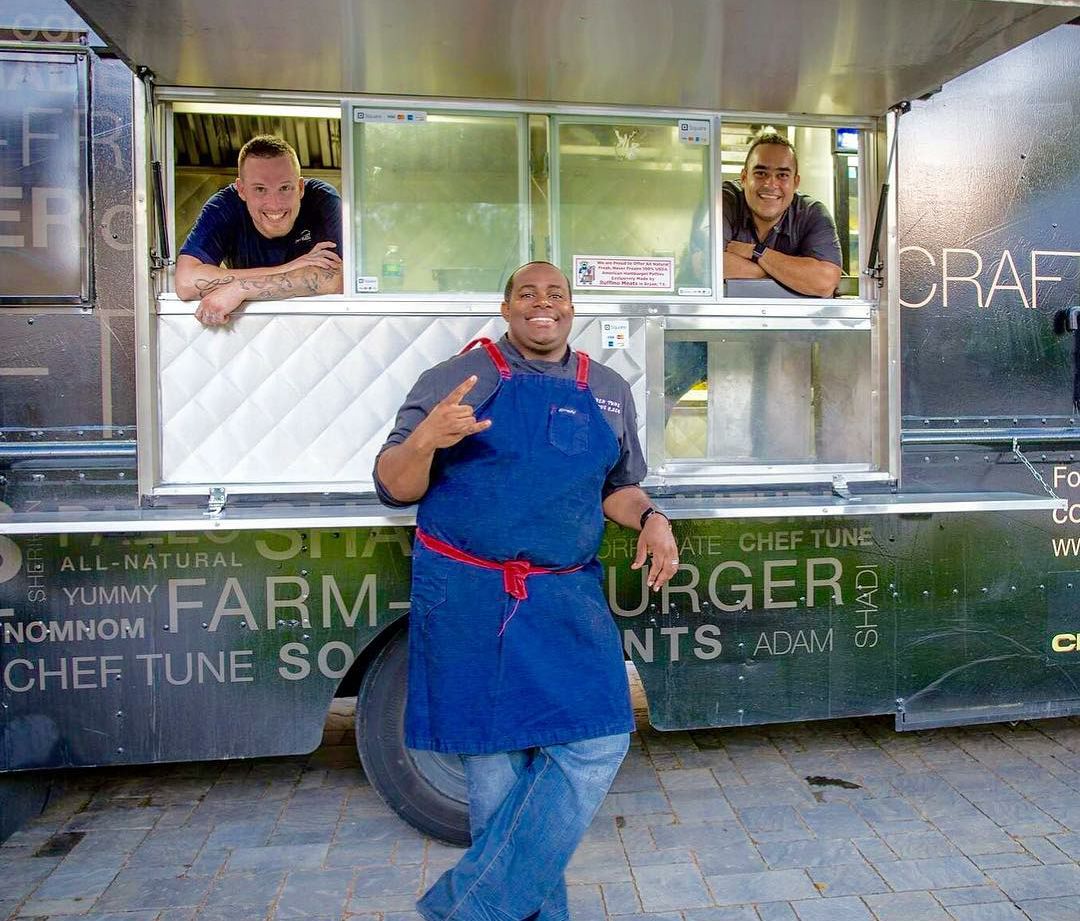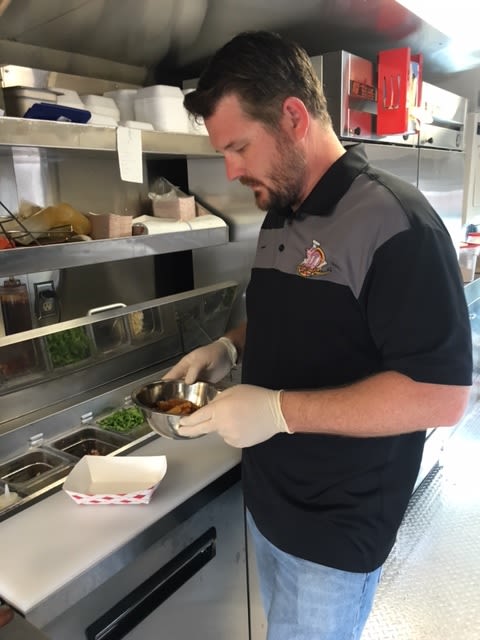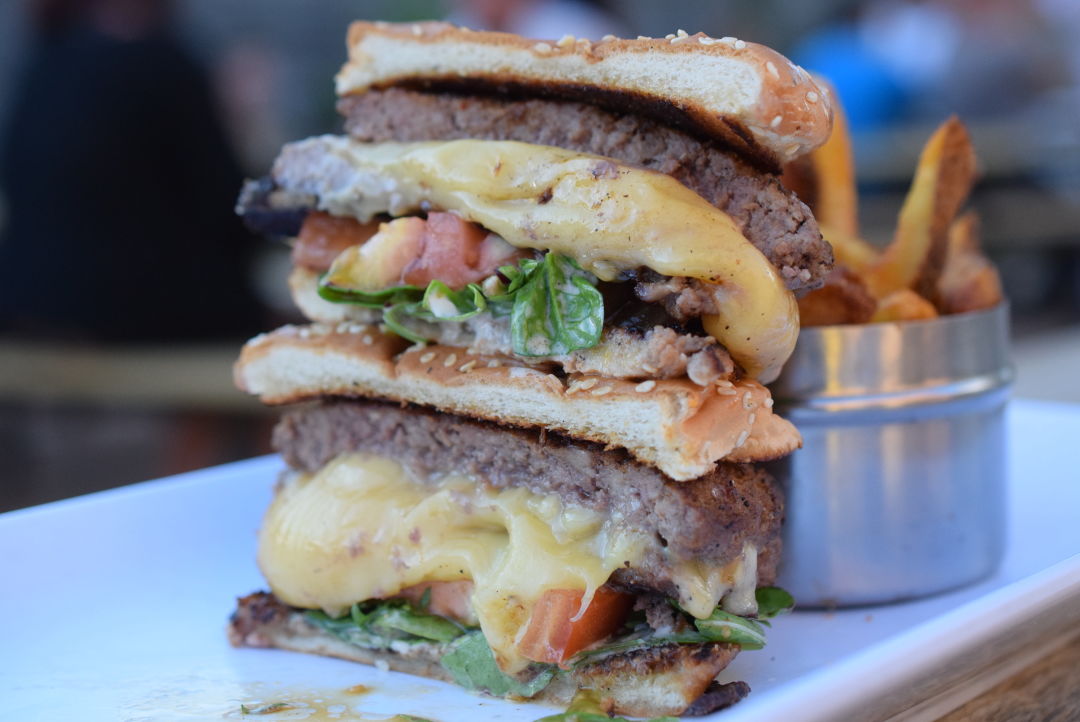Think Running a Food Truck is Easier Than Opening a Restaurant? Think Again

Craft Burger cameraderie.
Image: Courtesy of Craft Burger
The idea that running a food truck is somehow easier than opening a brick and mortar restaurant is a misconception shared by many. The popularity of food trucks has skyrocketed in the past five years. Food Network shows like The Great Food Truck Race and Food Truck Face-Off leave audiences with a romanticized idea of what is in reality a brutally challenging business. We spent time with two food truck chefs for a closer look at the reality.
A Typical Day on the Truck
Okay, the truth is this: there isn't one. But Shannen Tune, chef/owner of Craft Burger Food Truck and first Houstonian to win on Food Network’s "Chopped," was able to walk us through an ideal day:

Chef Garrett Blinn at work on Buttz Gourmet Food Truck.
Image: Justine Hernandez
“By 7 a.m. I am responding to all social media, returning voicemails, replying to e-mails and such," he told us. "After I’m done being the marketing manager, I head out to the commissary to replenish my water and oil supply. Next I have to go out and buy ingredients. We’re not talking H-E-B or Restaurant Depot. The menu contains a lot of specialty ingredients, which means I am at the mercy of a mobile purveyor regardless of their location or the time. Once everything is bought and prepped, it’s time to find somewhere to finally begin service.”
Garrett Blinn, chef/owner of Buttz Gourmet Food Truck, said that he puts in anywhere between 70 to 80 hours a week on average. With only one employee, Blinn’s plate is full with a combination of shopping for supplies, food prep, service, cleaning, and social media.
Commissaries, Inspections and Breakdowns, Oh My!
Unbeknownst to most, operating a food truck entails a variety of obstacles not encountered when running a standalone restaurant. While an inspection is only required twice a year for restaurants, food trucks are inspected annually for every permit in every county in which they operate. Buttz Gourmet Food Truck was inspected nine times in its first 18 months of operation. Food service comes to a halt when the trucks undergo inspection, meaning a loss in profit, missed road time and disappointment for hungry patrons.
A part of passing inspection requires food trucks to take a daily trip to the commissary. These established commercial kitchens give food truckers access to food storage, cleaning and disposal areas as well as on-site mechanics for vehicle repairs. Every single day, at the very minimum, the truck is washed inside and out, and fresh water and cooking oil must be replenished. This regular mandatory maintenance makes for an extremely sanitary workplace, discrediting any rumors about food trucks being filthy.
Unfortunately, Murphy’s Law prevails no matter the amount of care and preparation. “Imagine everything that can go wrong in a kitchen but on a moving thing. A food truck has all the issues of a vehicle plus all the issues of a restaurant,” explained Tune, who had to replace his engine twice within six months. Blinn’s luck was no better when his entire operation burned to the ground in November 2015, putting him out of business for six months. A fully equipped truck can hold any number of devices such as a flat top grill, deep fryers, stoves, ovens, fridges or freezers—all appliances that were never intended for mobility, which can create some volatile circumstances.
Unexpected Challenges: Big City, High Temperatures
Scarce customers. A car-congested city. Blistering Texas heat. These are all factors that make realistic business projection difficult for food truckers. Standing restaurants have the advantage of permanence. A food truck, however, heavily relies on a strong brand and the power of social media to convince guests that they should seek out food at ever-changing locations. Tune has yet to partner with a standalone business, so instead he makes regular visits to office buildings, apartment complexes and the Houston Food Truck Park. Blinn is established at Liberty Station every Tuesday, but before the partnership he stumbled upon some unforeseen errors in his forecasts. “My goal was to earn $500 a day," he told us. "If each meal averaged to $10, then I only had to feed 50 people. Little did I know, the hardest part was finding those 50 people. In an office building with 700 people, only five to 10 percent would actually show up. That’s only about 35 people.”
In a city so vast and seemingly close to the sun, it is easy to see why the foot traffic is so light. For those lucky enough to have air conditioning, the truck can still reach temperatures around 115°F. The less fortunate can face temperatures upwards of 150°F.

This might be worth your time.
Image: Courtesy of Craft Burger
Why Would Anyone Run a Food Truck?
Both interviewees shared candid information about their hardships, many of which would send most people out of the industry for good. When asked “Is there anything good about running a truck? Why do you do it?” both responses were commendable. Blinn’s fulfillment comes from happy customers. Interacting with his patrons and getting direct feedback make it worthwhile at the end of the day, he says. For Tune, being his own boss and making his own hours allows him to spend more time with family—a difficult task for anyone in the hospitality business.
Competing in this rolling legion of entrepreneurs is a daunting venture that receives little acknowledgement. Thankfully, Houston’s food truck community is very tight. Empathy, it seems, creates a strong bond. While restaurants are competing with one another, food truck owners work to support and promote each other.
Whether the end goal is to expand into a national brand or use the opportunity as advertisement for another endeavor, one thing is clear: Owning a food truck is the ultimate learning experience. Both chefs were shining examples of persistence and growth—always taking their situations in stride and learning from their trials. As Blinn puts it, "When you’re at a loss, you have to look at things like this: If today was bad, at least yesterday was good. If the week was bad, at least the month was good. If the month was bad, at least the quarter was good. You have to look at the totality of your business and not get too wrapped up in your day to day."
Those who plunge into the food truck world endure these struggles on an everyday basis, laboring to (literally) deliver us a taste of their vision. So next time you think about quitting your day job to open the next big mobile eatery, remember that just being a great cook will not equip you for success. It's best to leave it to the one-man shows like Tune and Blinn, who continue to seek out the perfect recipe for food truck survival.




